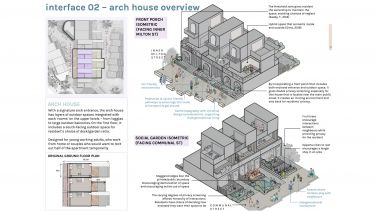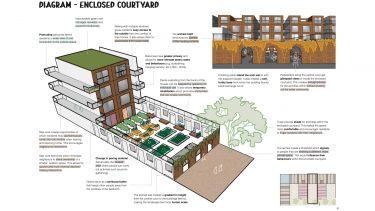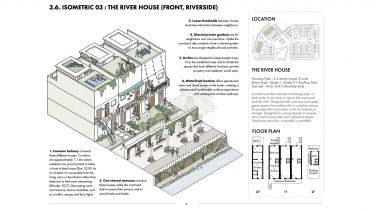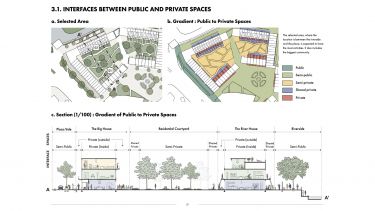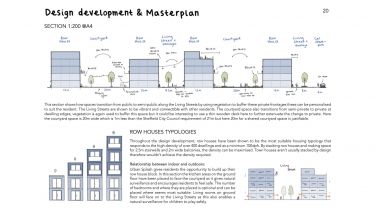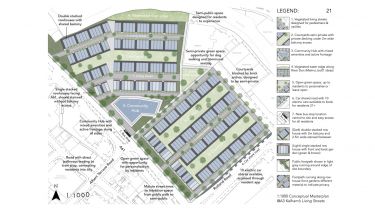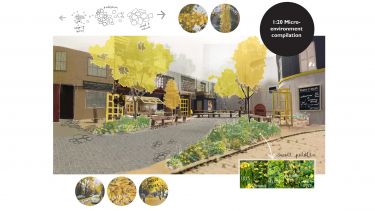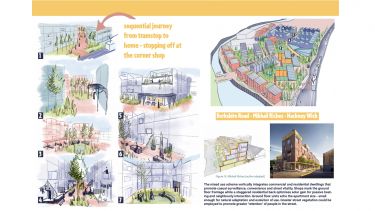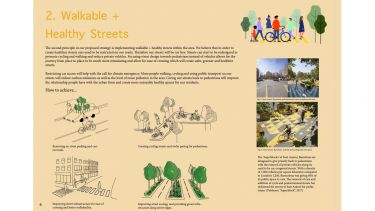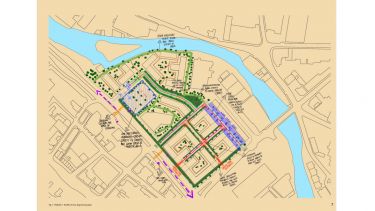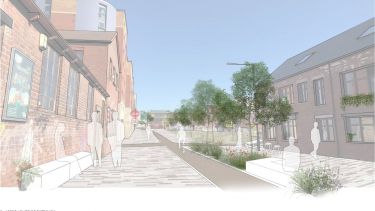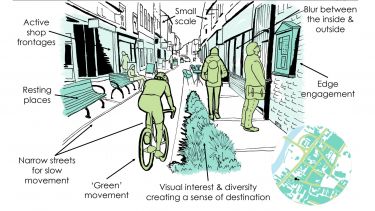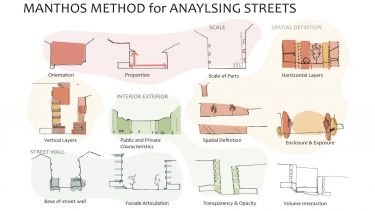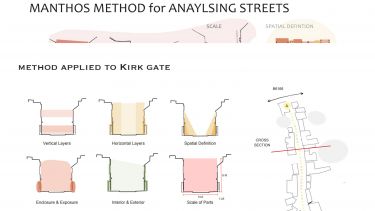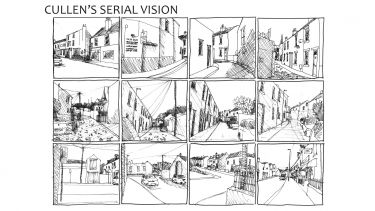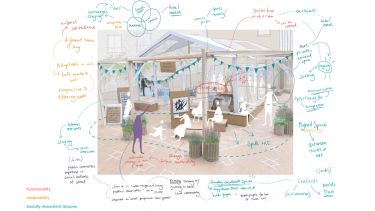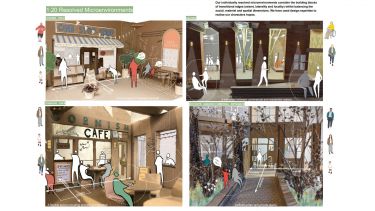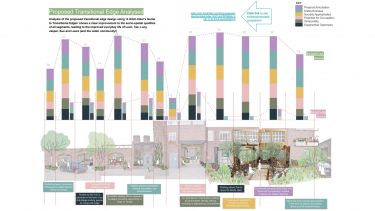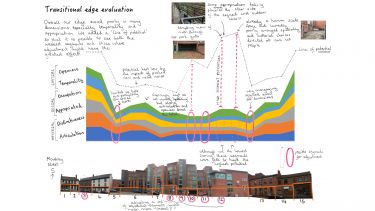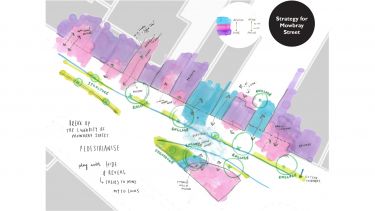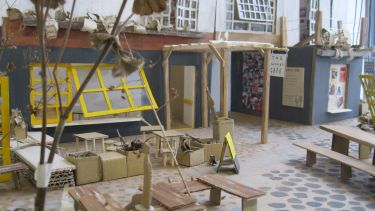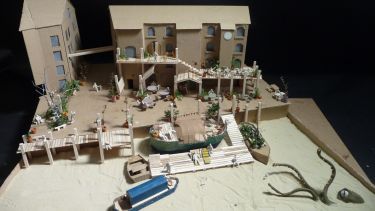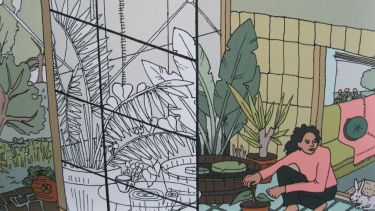Teaching
One way the Socio-spatial Urbanism Unit (SsUU) engages with a socially oriented approach to urban design is through research-led teaching.
Aspects of the SsUU research agenda, such as experiential landscapes and socially restorative urbanism, are incorporated into module design, workshop and online formats, across several modules delivered in the School of Architecture and Landscape at the University of Sheffield.
Final year master’s students also have the opportunity to further explore Socially Restorative Urbanism through a self-driven special design project across tackling one of the following themes:
- A mental orientation that sees urban realm as experience, founded on an explicit understanding of holistic human-environment relationships as mutually interdependent and transformative.
- Recognition of the interdependency of social, spatial and material dimensions of urban morphology and the human experience of it.
- The primacy of transitional edges, as socio-spatial components of urban order, especially their key significance to the social life and vitality of the urban realm.
- Emphasis on the need for accessible and inclusive forms of communication capable of overcoming professional and community boundaries and discipline specific boundaries.
- Development of cross-disciplinary research and practice that can better integrate built environment disciplines with psychology and sociological principles.
- Development of new readings of the urban realm more closely related to territorial functioning and in particular the need for a better balance between professional intervention and occupant self-organisation.
Site Planning for Sustainable Housing
This module introduces how the delivery of housing provision can be achieved through exploring differing approaches to the sustainable creation of a housing site that socially, ecologically and economically responds to the vision of Sheffield City Council:
Our vision is to provide more homes and for housing to be at the heart of high quality, safe and distinctive places to enable Sheffield’s communities to thrive.
Sheffield City Council, 2013
Urban Design for Pedestrian Experience
Urban regeneration is playing an increasingly important part in enhancing environmental quality and quality of life in cities around the world.
This module addresses the patterns and processes that currently influence urban design, examining theories and typologies of urban form, the drivers of urban change and urban regeneration.
It investigates the relationship between urban form and the human experience of this as part of the urban landscape.
Urban Design Project
The urban design project provides opportunities to explore part of Sheffield undergoing intensive regeneration and develop design solutions that contribute to this ongoing process.
We will approach this from a human perspective and ask how processes of regeneration and design can bring about urban places capable of sustaining fulfilled human lives.
The underpinning ethos of the project is to shift the balance away from a 'professionals eye view' of the urban environment, emphasising instead the perspective and experiences of people who use and inhabit it.
Achieving this means, in the words of Amanda Burden, that if you want to make places that people will want to be in and use, '....you don't tap into your design expertise, you tap into your humanity.'
Special Project
Everyday urban experiences: atmospheres, rhythms, embodiment and affordance
Studio led by Dr James Simpson
As we move though urban spaces our bodies are affected by the multi-sensory complexity of the environment around us. We feel the texture of the ground, see the movement of trees, hear the chatter of others and smell the scent of vehicles, food and vegetation.
As landscape architects we have an opportunity to manipulate, edit, define and encourage how such places are made and re-made over time; and as a result experienced by people.
Advances cognitive neuroscience and environmental psychology, alongside cultural geography and wider social sciences are providing new insights into the way urban environments are experienced by people.
Using insight as a foundation, this studio group aims to explore how intervention in urban environments – spanning professional top-down and community bottom-up actions – can create spaces that stimulate, excite and nurture. These interventions aim to not be viewed through social media but instead inhabited, enacted and experienced: the everyday event, not the Instagram event.
Socio-spatial urbanism: It’s a people thing!
Studio led by Dr Kevin Thwaites
This Special Project theme is focused on exploring and contributing to the developing socio-spatial urban design agenda of Socially Restorative Urbanism (SRU). Socially Restorative Urbanism develops a theory and practice based approach to urban design which responds to a growing and internationally significant need for more human-oriented approaches to the development of urban realm.
Through a focus on the mutually transformative interplay between people and their built environment, SRU shows how professional practice and community understanding can be brought together to help inform urban place-making, its adaptation and evolution.
Special Project work contributes to the SsUU research and practice agenda by exploring the integrated nature of social, spatial and material dimensions of human-environment interaction through the medium of landscape architecture and urban design decision making.
In particular we want to be able to see how the discipline(s) can be deployed to address significant human and social issues.

